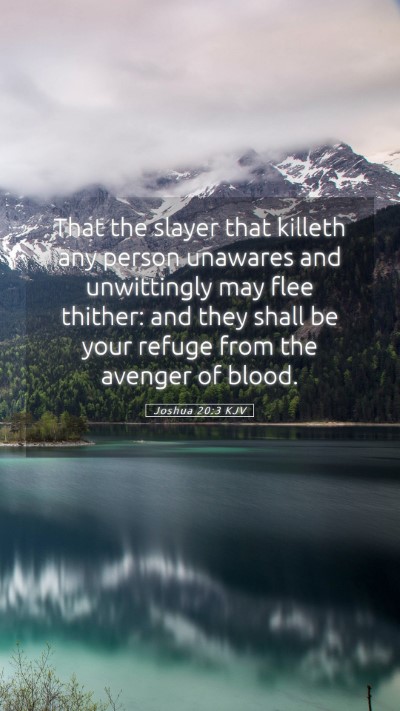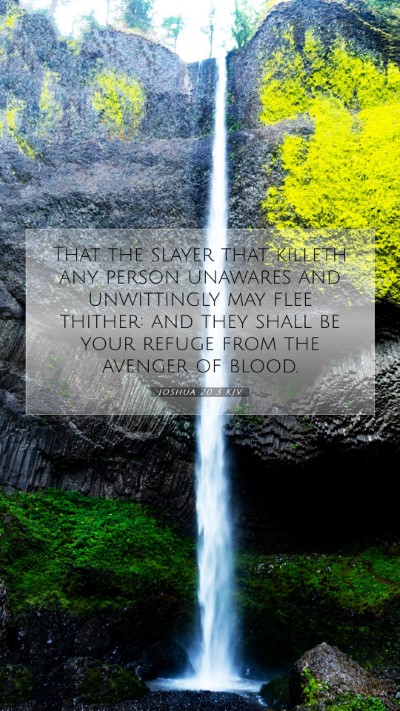Old Testament
Genesis Exodus Leviticus Numbers Deuteronomy Joshua Judges Ruth 1 Samuel 2 Samuel 1 Kings 2 Kings 1 Chronicles 2 Chronicles Ezra Nehemiah Esther Job Psalms Proverbs Ecclesiastes Song of Solomon Isaiah Jeremiah Lamentations Ezekiel Daniel Hosea Joel Amos Obadiah Jonah Micah Nahum Habakkuk Zephaniah Haggai Zechariah MalachiJoshua 20:3 Meaning
What is the meaning of Joshua 20:3?
That the slayer that killeth any person unawares and unwittingly may flee thither: and they shall be your refuge from the avenger of blood.
Joshua 20:3 Bible Verse Meaning
Bible Verse Commentary on Joshua 20:3
Verse Reference: Joshua 20:3 - "That the slayer that killeth any person unawares and unwittingly may flee thither: and they shall be your refuge from the avenger of blood."
Overview of Joshua 20:3
This verse is part of a section in the Book of Joshua that discusses cities of refuge, established in Israel for individuals who accidentally cause the death of another person. The cities provided a sanctuary, allowing the accused time to present their case and escape the vengeance of the deceased's family until justice could be properly served.
Insights from Public Domain Commentaries
Matthew Henry's Commentary
Matthew Henry notes that the provision for cities of refuge showcases God's mercy and justice. It reflects His desire to protect individuals who commit accidental homicide from unjust punishment. Henry emphasizes the protective nature of these cities, where a person could seek asylum. This illustrates a broader principle of divine justice, where God establishes means for mercy amid the rigid human laws of retribution.
Albert Barnes' Notes on the Bible
Barnes discusses the practical implications and significance of these cities, serving as a form of legal due process. He suggests that the legislation regarding refuge cities distinguishes between malicious and accidental acts—underscoring the importance of intent in administering justice. Barnes highlights the socio-cultural context in which these rules were established to safeguard against the impulsive actions of avengers blinded by grief.
Adam Clarke's Commentary
Clarke elaborates on the notion of being "unawares and unwittingly" as a crucial factor in determining the nature of the act of killing. He asserts that this concept conveys an important theological truth about human responsibility and accountability. Clarke posits that unintended actions will be treated differently in the eyes of God, echoing the mercy embedded in divine governance over human affairs. He also points out that cities of refuge not only served a legal purpose but also symbolized God's provision and protection over Israel.
Spiritual and Practical Applications
- Understanding Justice: The verse invites believers to reflect on the nature of justice and mercy, encouraging a balanced view that integrates both elements in human interactions.
- Divine Protection: It reassures believers that God provides protection and avenues for redemption even in cases that seem dire, encouraging a deeper trust in divine providence.
- Intent vs. Action: The distinction made between accidental and intentional actions encourages individuals to consider their motives and the implications of their actions in daily life.
Related Bible Verses for Further Study
- Exodus 21:13 - "And if a man lie not in wait, but God deliver him into his hand; then I will appoint thee a place whither he shall flee."
- Numbers 35:11-12 - "Then ye shall appoint you cities to be cities of refuge for you; that the slayer may flee thither, which killeth any person at unawares."
- Deuteronomy 19:4-6 - "And this is the case of the slayer, which shall flee thither, that he may live: whoso killeth his neighbor ignorantly, whom he hated not in time past."
- Hebrews 6:18 - "That by two immutable things, in which it was impossible for God to lie, we might have a strong consolation, who have fled for refuge to lay hold upon the hope set before us."
Conclusion
In summary, Joshua 20:3 serves as a profound testament to God's justice and mercy, addressing human frailty and the nature of sin. Understanding this verse enriches our biblical comprehension and deepens our appreciation for the systems of refuge established in ancient Israel. For those engaged in bible study groups or online Bible study, this scripture provides ample bible study insights and is an excellent bible study topic for exploring themes of justice, redemption, and divine compassion.


